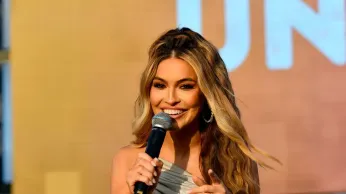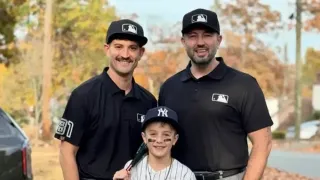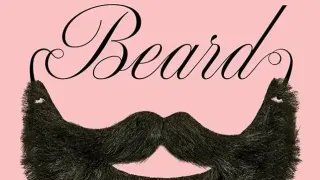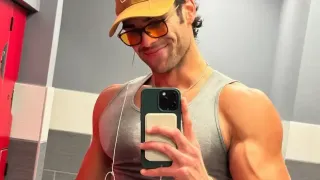
9 hours ago
Chrishell Stause: Queering the Sunset and Calling Out the Shadows
READ TIME: 4 MIN.
When Selling Sunset first graced our screens, it promised luxury real estate, high-gloss drama, and the kind of L.A. glamour that made us all want to trade up our rental apartments for a mansion with a view. But as the series rolls into its ninth season, the real transformation isn’t just in the property listings—it’s in the unapologetically queer energy radiating from Chrishell Stause and her relationship with nonbinary Australian singer G Flip. Their love story is more than a plot twist; it’s a cultural evolution, queering the show’s DNA and challenging every narrow expectation the reality TV world has tried to set for women, partnerships, and friendship on screen .
Chrishell’s journey from the heartbreak of a public divorce to the joy and pride of marrying G Flip has been anything but linear. Through every episode, reunion, and Instagram story, she’s become a lightning rod for queer representation—sometimes by choice, sometimes by necessity, always with fierce vulnerability. “I only ever want to do a little bit to support Chrishell and also to be representation. Representation is so important for the queer space — and to show healthy queer relationships and non-binary representation,” G Flip explained, highlighting the intersection of love, visibility, and activism that drives their relationship, even when the cameras feel “real toxic” .
It’s easy to forget, amid the open houses and champagne, that reality TV is never just entertainment for queer people. It’s a battleground. This season, Chrishell found herself in the crosshairs of castmate Bre Tiesi, who, according to Chrishell, used the outdated and offensive term “transvestite” when referring to G Flip, who is nonbinary. Stause didn’t let it slide. She took to Instagram—not just to defend her partner, but to educate her audience: “Not my job to teach her that this term is EXTREMELY outdated, but here’s a free education,” she wrote, posting the dictionary definition and refusing to diminish the harm done .
But the microaggressions didn’t end there. Chrishell has repeatedly had to correct misgendering and call out homophobic remarks from her castmates, most notably at the Season 7 reunion, where Nicole Young was confronted for liking an Instagram comment that read, “I was hoping the lesbian chick was off in Australia this season and not on our screens.” Chrishell’s response was iconic queer rage: “Say whatever you want about me, I’m a tough bitch. But don’t go after my partner. Ever… If you’re gonna literally go to homophobic people and cheer them on because they hate me for that reason, that is hate, Nicole” .
Selling Sunset has become a stage for these necessary confrontations—a space where the messy, unfiltered reality of being openly queer in a mainstream environment plays out for millions. When Nicole Young attempted to sidestep accountability, insisting she didn’t see her actions as homophobic, it was Chrishell and her allies (yes, even some of the straights!) who broke down why words matter, why solidarity matters, and why silence is never an option .
If the past seasons of Selling Sunset were about ambition and rivalry, Chrishell’s arc this year is about boundaries and self-preservation. Her friendship with Emma Hernan—once the show’s poster-child for ride-or-die solidarity—has fractured, a casualty of the show’s relentless churn and the mounting emotional toll. “Some people are GREAT for TV, but when it comes to talking about our real issues (using slurs etc) they tend to be cut. So use this as a guideline when you watch season 9,” Chrishell posted, signaling her readiness to walk away from relationships (and perhaps the show itself) that don’t honor her truth .
This isn’t just reality TV drama; it’s a reflection of what so many queer viewers know firsthand. Chosen family is sacred, but not every friendship survives the pressure of public scrutiny, hurtful comments, or the kind of betrayal that feels “unforgivable.” For Chrishell, the cost of visibility is real, and her refusal to accept less than respect is the kind of boundary-setting that reverberates far beyond the Oppenheim Group’s glass doors.
G Flip, for their part, continues to support Chrishell, even as they acknowledge the “toxic” atmosphere of reality TV production. “Every scene I’m in, I’m secretly hating it,” G Flip told PEOPLE, but their presence is a deliberate act of queer visibility—a gift to viewers yearning for healthy, authentic nonbinary representation .
Selling Sunset Season 9 is set to premiere on Netflix on October 29, 2025, and while Netflix hasn’t officially announced a tenth season, the cast’s on- and off-screen dynamics are already reshaping the cultural conversation . Chrishell’s path—public, painful, and ultimately empowering—illuminates a new template for queer visibility in reality TV. It’s not about being perfect; it’s about being real, about refusing to shrink or apologize, even when the world wants you to.
For LGBTQ+ viewers, Chrishell’s refusal to let homophobia and transphobia slide is a masterclass in self-advocacy. Her candidness, wit, and willingness to call out harm are reminders that queer joy and queer rage can—and must—coexist. Selling Sunset’s queer revolution isn’t just about who gets to fall in love on screen; it’s about who gets to set the terms, demand respect, and, when necessary, say: “I’m done.”
Because sometimes, to build a better world, you have to tear down the old one. And if you’re lucky, you get to do it in a killer outfit, with your chosen family by your side.






